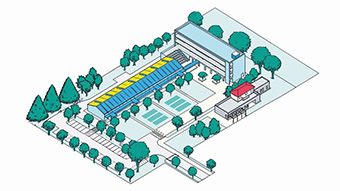An innovative project is creating a model for integration of refugees in the local communities in which they live. The SALUS W SPACE project is developing a centre in the city of Bologna in Italy with housing for newcomers and city residents, shared leisure facilities, and support for both groups to find work or start businesses.
- 22 June 2018
With citizens and stakeholders, we are designing and implementing a creative, innovative model for refugee reception integrated with the social and economic fabric of urban areas. Our model fosters intercultural exchange and opportunities to create new jobs.
Bologna has almost 1 000 refugees living in the city, many staying long term. The Municipality of Bologna and 16 other organisations are developing the SALUS Space to foster integration, inter-community cohesion and employment.
After extensive input from local citizens, the project’s building plan is complete. The centre will transform an abandoned site to provide temporary homes for around 80 people: around 40 refugees and 40 people from families in vulnerable situations, along with a vocational training and business support centre, social cooperative restaurant, vegetable garden, theatre and handicraft workshops.
Building trust
The project is setting up the centre on the site of a disused hospital, the Villa Salus, in Bologna’s eastern suburbs. As the original main building did not meet modern earthquake-resistance standards it is being replaced with two new structures, due for completion by mid-2019. However, a smaller building was safe and is being renovated first so that refugee welcoming and training can begin earlier.
Initially, local people had concerns about the proposed centre. Extensive communication and involvement of citizens in evaluating design proposals has increased their trust. The final design was presented to the public in October 2017. Citizen evaluators will continue to assess the project as it progresses, adding an ‘on-the-ground’ perspective to that of the project’s expert evaluators.
Groups such as NGOs and religious networks have also each appointed a representative to a local stakeholder information group, launched in June 2017. This group will help to develop the project’s management system and plan for its long-term social and economic sustainability. Meanwhile local administrations are receiving policymaking support from a United Nations High Commissioner for Refugees (UNHCR) representative.
A model project
As well as integrating refugees into Bolognese society, the centre is helping the city address existing problems. Despite an increasingly low proportion of young people of working age, the city’s average unemployment rate was 24 % in 2015 and over 30 % of families have relied on social services since 2005.
In SALUS Space, local people and newcomers will be able to increase their skills, opportunities and general well-being, benefiting the local economy and society. Partners expect the project to result in businesses and jobs from the second half of 2019, when the centre opens to the public.
This inclusive concept of support followed by ‘giving back’ to society is known as ‘generative welfare’. SALUS Space aims to become a think tank for developing this model further, a training centre for social workers and an example for future similar centres. Other cities showed interest in the project’s concept at the Cities Forum in Rotterdam in November 2017.
Total investment and EU funding
Total investment for the project “S.A.L.U.S. ‘W’ SPACE - Sustainable Accessible Livable Usable Social Space for Intercultural Wellbeing, Welfare and Welcoming” is EUR 6 249 673, with the EU’s European Regional Development Fund contributing EUR 4 999 738 through the “Urban Innovative Actions” initiative for the 2014-2020 programming period.

